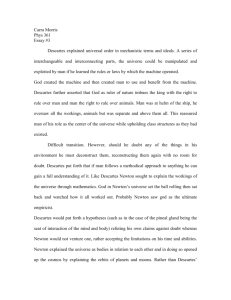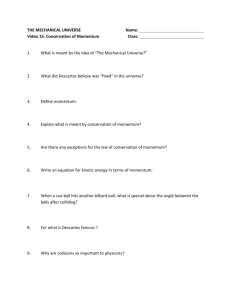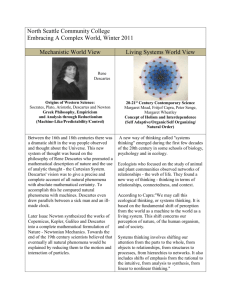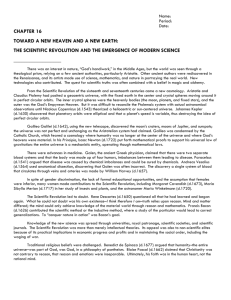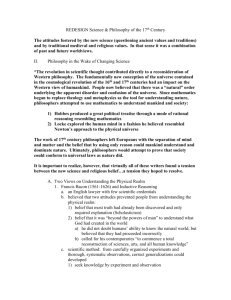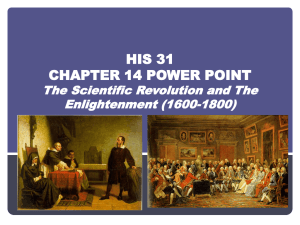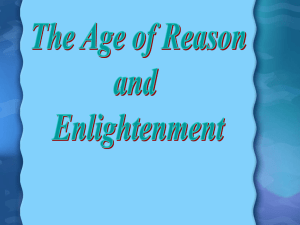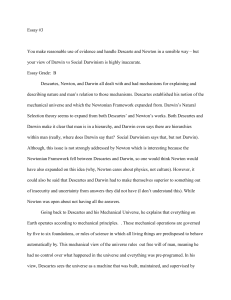steiger-jn
advertisement
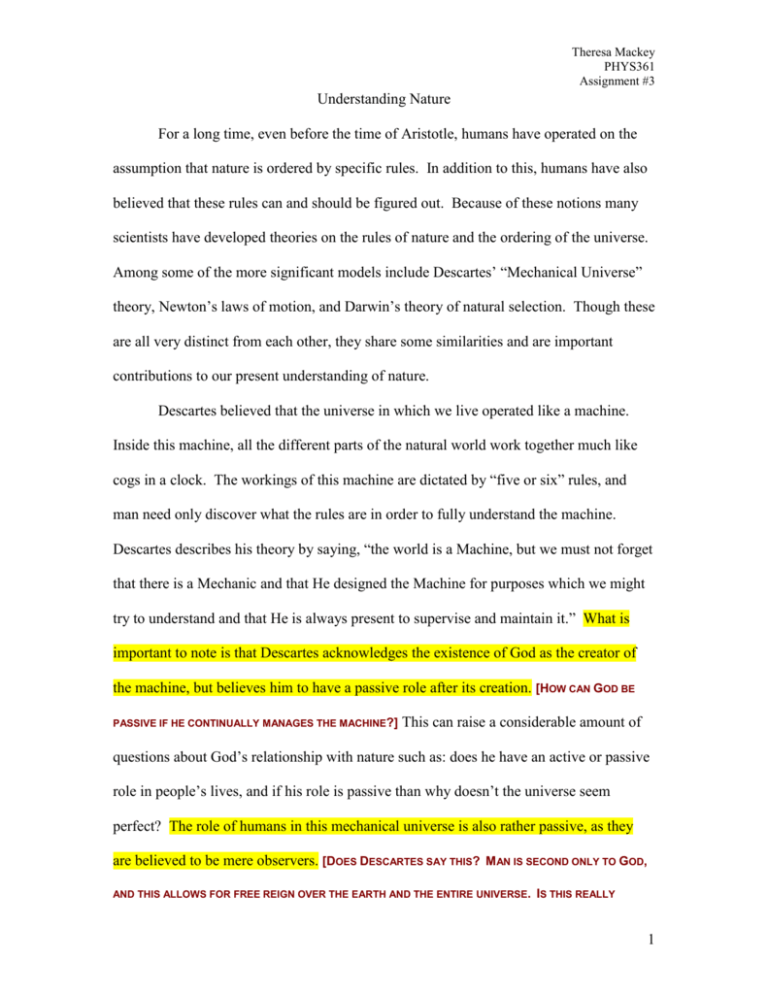
Theresa Mackey PHYS361 Assignment #3 Understanding Nature For a long time, even before the time of Aristotle, humans have operated on the assumption that nature is ordered by specific rules. In addition to this, humans have also believed that these rules can and should be figured out. Because of these notions many scientists have developed theories on the rules of nature and the ordering of the universe. Among some of the more significant models include Descartes’ “Mechanical Universe” theory, Newton’s laws of motion, and Darwin’s theory of natural selection. Though these are all very distinct from each other, they share some similarities and are important contributions to our present understanding of nature. Descartes believed that the universe in which we live operated like a machine. Inside this machine, all the different parts of the natural world work together much like cogs in a clock. The workings of this machine are dictated by “five or six” rules, and man need only discover what the rules are in order to fully understand the machine. Descartes describes his theory by saying, “the world is a Machine, but we must not forget that there is a Mechanic and that He designed the Machine for purposes which we might try to understand and that He is always present to supervise and maintain it.” What is important to note is that Descartes acknowledges the existence of God as the creator of the machine, but believes him to have a passive role after its creation. [HOW CAN GOD BE PASSIVE IF HE CONTINUALLY MANAGES THE MACHINE?] This can raise a considerable amount of questions about God’s relationship with nature such as: does he have an active or passive role in people’s lives, and if his role is passive than why doesn’t the universe seem perfect? The role of humans in this mechanical universe is also rather passive, as they are believed to be mere observers. [DOES DESCARTES SAY THIS? MAN IS SECOND ONLY TO GOD, AND THIS ALLOWS FOR FREE REIGN OVER THE EARTH AND THE ENTIRE UNIVERSE. IS THIS REALLY 1 Theresa Mackey PHYS361 Assignment #3 PASSIVE?] This is an enormously significant idea because it emphasizes Descartes’ view that humans are distinct from nature. Part of the rule set for this mechanical universe is a hierarchical ordering and classification system. It was this early classification system that prompted later scientists to become obsessed with the task of cataloging all species that could be found, and also started the discipline of Taxonomy. In Descartes’ hierarchy of nature, humans are not only separate from but also higher than other parts of nature like plants and animals. Humans were placed so high in this ordering system because it was believed that they were the only organisms in the universe with a soul, hence the idea of mind over matter and the famous quotation from Descartes “I think therefore I am.” Much like Descartes, Newton believed that nature was ordered according to certain physical laws. He also builds off of the ideas of Galileo and Kepler stressing the importance of the relationship between energy and motion. Especially significant is his idea of momentum, specifically conservation of momentum. This concept relates to the Mechanical Universe idea in that if god is the initial cause, than momentum is what keeps the machine going. The total momentum of universe does not change (it is conserved) even though individual interactions may redistribute the momentum. Newton in essence quantified the ideas of Descartes, what he described as “The latest authors, like the most ancient, strove to subordinate the phenomena of nature to the laws of mathematics.” In fact, he even needed to invent a new mathematical language, calculus, in order to fully explain these new laws of nature. Central to his model of the universe was his theory of universal gravitation. With mathematics he was able to prove that he was right even if his concepts, though observable on earth, could not be tested on a universal scale. Newton claimed that “I have not been able to discover the cause of those properties of 2 Theresa Mackey PHYS361 Assignment #3 gravity from phenomena, and I frame no hypotheses; for whatever is not deduced from the phenomena is to be called a hypothesis, and hypotheses, whether metaphysical or physical, whether of occult qualities or mechanical, have no place in experimental philosophy.” This is important because he is not claiming to know the cause of gravity, he is only able to mathematically explain how it works, and prove that it works universally. He supports this by saying, “To explain all nature is too difficult a task for any one man or even for any one age. `Tis much better to do a little with certainty, and leave the rest for others that come after you, than to explain all things.” By saying this he is setting the stage for later scientists to build off of his ideas. “There is one thing stronger than all the armies in the world,” he says, “and that is an idea whose time has come.” For Newton, it was enough for him to discover the forces at work in nature and leave the task of deducing the cause for those forces to someone else. Well done on the basics of the science. Nevertheless, his influence on the scientific realm is unparalleled. His rigid application of reason and logic to the workings of nature marked the start of an era known as the Age of Reason, and the basic principles he employed for scientific investigation are still used today and have remained largely unchanged. [YOU MISS THE SOCIAL IMPLICATION OF NEWTON. IN HIS UNIVERSE, GOD SET THE LAWS IN MOTION AND THEN STEPPED BACK. WHAT DOES THIS SAY ABOUT GOD? DOES HE CARE ABOUT THE UNIVERSE? ABOUT MAN? IF NOT, WHAT DOES THAT SAY ABOUT MORALITY AND MAN’S REDEMPTION?] Darwin in a way also built off of Descartes’ Mechanical Universe model, but he added one key element to distinguish his idea: random variation. According to Darwin’s theory of natural selection, populations evolve because of random variations within a species that are combined with a certain set of survival rules, which can produce certain changes over long periods of time. The concept of natural selection is different from that 3 Theresa Mackey PHYS361 Assignment #3 of survival of the fittest in that randomly occurring traits can be favorable within the rules of a randomly changing environment therefore favorable traits will be more likely to be passed on and the overall dynamic of a species can change over time. It is necessary to keep in mind that Darwin’s definition does not apply to the individual; instead it applies to a population and can only be accurate within a large group. The survival rules in this system are very similar to those of Descartes because they are a specific set of rules that dictate the order and workings of nature. However, Darwin’s rules can also be affected by random variants and they remain largely unknown until in retrospect one can see the changes through time and the effects on populations. Though he admits that at first glance his theory may seem questionable, with the application of simple logic he explains: “reason tells me, that if numerous gradations from a perfect and complex eye to one very imperfect and simple, each grade being useful to its possessor, can be shown to exist; if further, the eye does vary ever so slightly, and the variations be inherited, which is certainly the case; and if variation or modification in the organ be ever useful to an animal under changing conditions of life, then the difficulty of believing that a perfect and complex eye could be formed by natural selection, though insuperable by our imagination, can hardly be considered real.” Darwin understood that in order for evolution to exist, there had to be some kind of genetic variation, and from this he reasoned that the variant traits could be inherited. This idea later inspired a scientist named Mendel to publish his work on heredity, which he researched through comprehensive statistical analysis. All these ideas were highly controversial, especially where religious beliefs were concerned. For Darwin’s theory to work it not only required that humans were not originally created in the same form in which we remain, but it also requires that the earth be millions of years old, as opposed to the official standing of the church that the earth was only 6,000 years old. Later, his 4 Theresa Mackey PHYS361 Assignment #3 theory was adopted by scientists like Spencer and put into a social context as a way for ordering society, justifying class systems, and even creating the optimal superior race. [YOU DO NOT DISCUSS THE SOCIAL IMPLICATIONS OF EVOLUTION. DARWIN STATES THAT WE ARE NOT SPECIAL AND HOLD NO SACRED PLACE IN THE WORLD, THAT WE EVOLVED FROM LOWER BEINGS AND ARE NOTHING MORE THAN ANIMALS. NEED TO EXPAND. YOU DO HAVE A NICE INTRODUCTION TO “SOCIAL DARWINISM” BUT YOU THIS IS THE SOCIAL IMPLICATION OF EVOLUTION. IT IS AN ATTEMPT TO PUT HUMANITY BACK ON TOP AND ORDER SOCIETY. YOU NEED TO EXPLAIN THE IMPLICATIONS RATHER THAN SIMPLY RELATING THEM TO EVOLUTION.] All three of these systems, intended as ordering systems for nature and the universe, are based on the concept that nature has a rule set. Because these rules, though different for each scientist, are viewed as being detectable through logic and reason, they are also believed to be universal. Though each theory had different implications on both social and cultural levels, they all influenced later scientists to build off of their ideas. As a result, they are viewed today as significant contributions to the scientific world, and are evidence of a continually evolving view of nature. A- Well done, Theresa. Watch for inconsistencies in your argument. --jn 5
